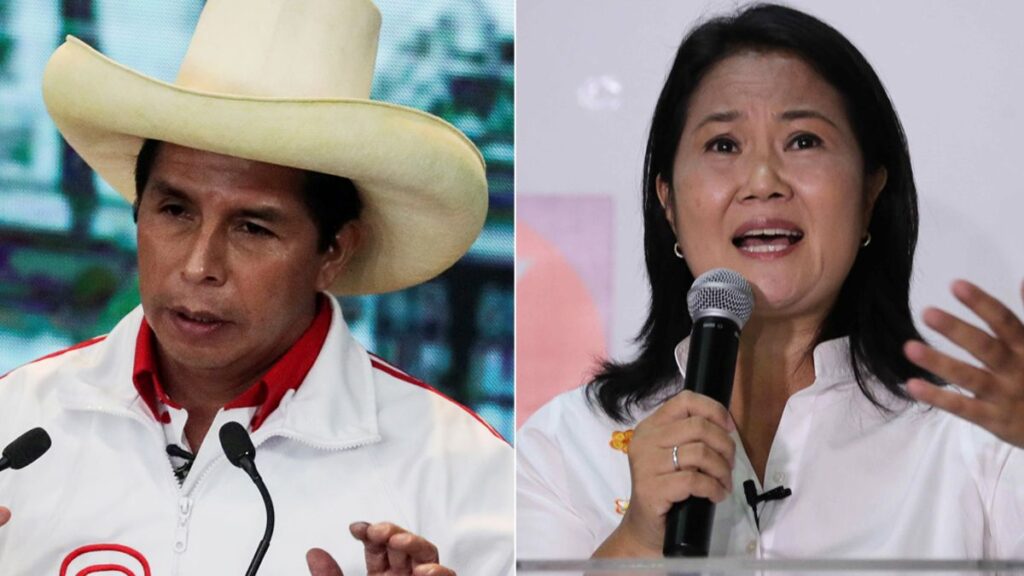About 25 million Peruvians have this Sunday the possibility of influencing the destiny of a country burdened by hardships. But the future worries them as much as the present: they must choose between two candidates for the presidency that two thirds of the citizens despised in the first shift: the teacher Pedro Castillo, champion of a left with fuzzy contours, and Keiko Fujimori, the daughter of the imprisoned autocrat, Alberto Fujimori .
They have reached the important appointment with the polls in a situation of virtual technical tie , according to the consultants IEP and Datum. Another survey company, Ipsos, gave Castillo a three-point lead. But anything can happen this Sunday . The undecided, which are millions, will have the last word. On April 11, 28% of the electorate stayed at home. Lowering that percentage can affect the bottom line.
It is the third time that Keiko Fujimori has fought for the presidency. It was defeated by Ollanta Humala, in 2011, and Pedro Pablo Kuczynski, in 2016. In both cases, Peruvians opted for ” the lesser evil .” But now it turns out that it is she who is presented to society as a tolerable damage in the face of an incognito aspirant.
The leader of Fuerza Popular has become the guarantor of family, religion and the continuity of the neoliberal economic model . The dilemma was summed up in a campaign song: ” Come on Peruvians, let’s not lose hope, come on Peruvians, we are going to get up, today we face a serious threat, we have to win against communism.”
Occasionally dressed in the jacket of the Peruvian soccer coach, Keiko has her base of support in the big cities . His rival claims to speak for the forgotten territories. A Castillo it has been presented as a covert supporter of Shining Path , the Maoist armed group that ravaged the country in the early eighty. Sometimes they place it in the Chavista orbit. Peru 21 newspaper warned its readers about “the political risks of communism that is irresponsibly promoted today.”
Another Lima newspaper, Gestión , assured that the Peru Libre candidate has behind himCuba, Venezuela, China and Russia . The daily El Comercio said that “the credentials” of Fuerza Popular “are not good.” However, Castillo represents a ” greater threat .” The markets bet decisively on Fujimori: the price of the dollar has skyrocketed. Economists predict the seven plagues if he loses.
An unstable scenario
Castillo has tried to show himself at the close of the campaign as a reasonable progressive. Just as Fujimori daughter sought the endorsement of Mario Vargas Llosa , he believed he found it in José Pepe Mujica . “What dance have you gotten into?” Said the Uruguayan president.
“Do not fall into authoritarianism, bet on the heart of your people,” he recommended. “I am going to show my country loyalty, I am going to show respect, all my experience as a teacher, as a peasant, respecting this Constitution that is taking us to the political and democratic scene,” the candidate replied.
The elections were preceded by the massacre of 16 people in a town located 400 kilometers from Lima . The government did not hesitate to attribute the murders to a remnant of the Shining Path reconverted to drug trafficking. This is not the only previous episode of tension. Fujimori has slipped the possibility of fraud at the polls .
“I ask you to communicate through social networks to the different people who are organized in different regions to be able to take care of the vote,” said the candidate. Jorge Luis Salas, the main authority of the National Elections Jury (JNE), immediately disavowed it. The rumors spread by Fuerza Popular, he said, are more than a ” serious fantasy”And they do” damage “to democracy by” sowing doubts “about the vote.
The pandemic has thrown into poverty more than one third of the population. The virus, on the other hand, has left Peru with the highest mortality rate in the world. Governance was a problem before the arrival of the virus, to the point that Peruvians had three different presidents in a few hours ( Martín Vizcarra, Manuel Merino and the current interim ruler, Francisco Sagasti).
Analysts are not overly confident that the future president can reestablish institutional balance. The elections, in that sense, are seen only as the prelude to days of instability. If Castillo should win, he would have to coexist with a hostile Congress and with the ability to promote a vote of no confidence. The problem for Fujimori would not be the Parliament but the street. An ocean of unsatisfied demands awaits either one.
